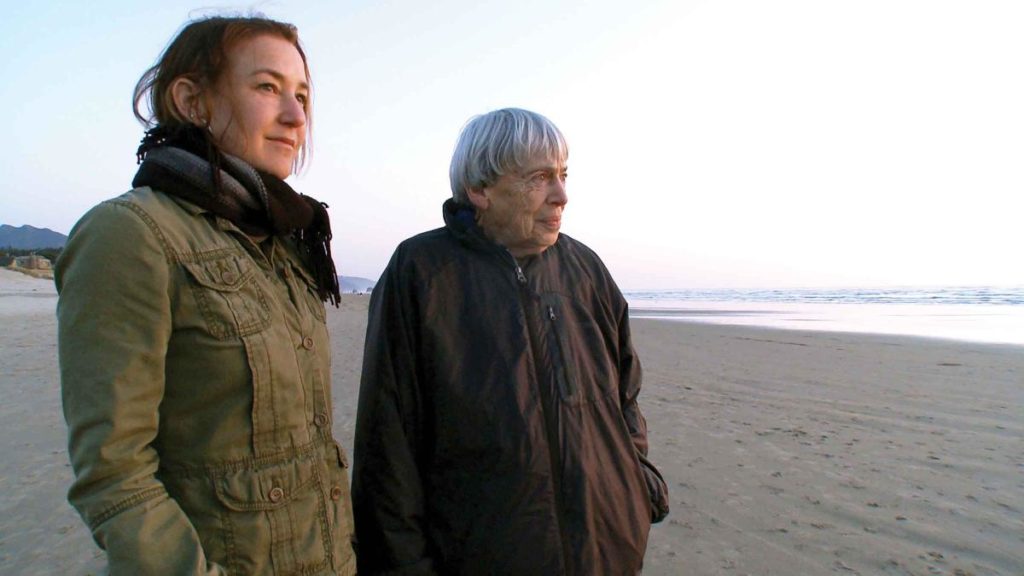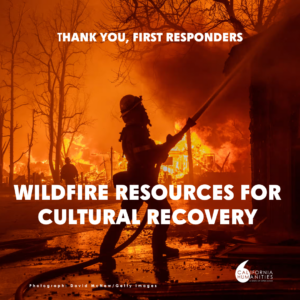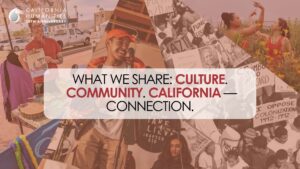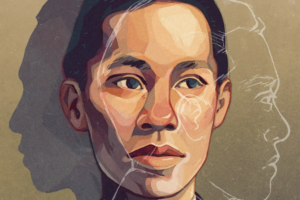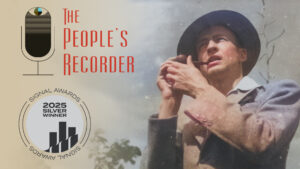As an early funder of the documentary Worlds of Ursula K. Le Guin, we knew that we were a part of something special. In the interview below with filmmaker Arwen Curry, we ask about how it was getting to know the famous and highly imaginative science fiction and fantasy writer Ursula K. Le Guin, author of A Wizard of Earthsea (1968), The Left Hand of Darkness(1969), and The Dispossessed (1974), to name a few. Below, Curry talks about how Le Guin’s notoriety changed during the filming, the similarities between their lives and her own favorite reads.
California Humanities: What, in your words, is your film Worlds of Ursula K. Le Guin about?
Arwen Curry: My film is about the life and the legacy of the acclaimed author Ursula K. Le Guin, who passed away in 2018 at the age of 88. Ursula was best known for her fantasy and science fiction novels, but she wrote across many different genres and left a deep impression on generations of authors and readers.
CH: California Humanities was an early funder of the film. As you know, it premiered at the 2018 Sheffield Doc Fest, and it opened for a limited run of screenings in a number of cities this year, including in San Francisco. What has it been like for you since the premiere, and what has the response been?
AC: It’s been a really gratifying experience to take the film all over the country and the world. I’ve encountered a lot of curiosity and interest everywhere I’ve gone. What I’ve discovered is that there’s a real hunger for this film among people who already were familiar with her work and had a very passionate relationship to her as readers. And some people who haven’t read her work get excited by seeing these glimpses of it in the film and by meeting her on the screen. They’re motivated to go and get the first book and are really eager to start reading. That makes me feel like we are succeeding in reaching both an audience who is really deeply familiar with her and another audience who isn’t so familiar.
CH: How did you find this story?
AC: I had been a reader of Ursula K. Le Guin’s books as a young person and was curious about who the person was behind the novels. I identified not only with the quality of her work and the magic of the worlds that she created, but also her groundbreaking ideas about gender and about the different kinds of worlds we could inhabit; the daring of her imagination. I wanted to know more about the person who had invented these worlds and decided that it should be a film. That was the beginning of what would be a long journey.
CH: What was your relationship like with her?
AC: The span of making the film was actually more than a decade. Ursula and I got to know each other and stayed in touch with this creative project as a touchstone, but meanwhile our lives unfolded around it. I developed a friendship with her that I will always cherish. That was an incredible gift.
CH: What level of involvement did she have in the creation of the film?
AC: It was always understood that that the film was editorially mine and I had her there as a reviewer. Of course, it was about her life, and I wanted her to be able to correct anything that I was not getting right. I think she held a distance that to her seemed appropriate.
I also wanted her masterful eye on it as a piece of art. It must have been an interesting exercise for her to think of the story of her own life as a work of art. She did write about her own life sometimes, but not as much as many writers do. It would have been very foolish for me to not have taken advantage of that great editorial perspective she offered.
CH: Did the story that you set out to tell ten years ago change? If so, what were some of the most significant changes?
AC: In the last ten years of her life, Ursula moved from still being somewhat on the fringes to being at the center of American literature in a way that she had deserved to be for many decades. Near the end of her life, especially when she was given the National Book Award for literature in 2014, she was really kind of on a public stage. She was being lauded as one of our American greats. It was good to be able to put that point on the film—to say we have come around now to understand that this is one of our most vital literary voices.
I had also wanted to tell the story of her coming into her own as a feminist. That is a story I had intended to tell and ended up telling, but I didn’t know quite how I would do it at the beginning.
CH: Do you personally identify as a feminist?
AC: I certainly identify as a feminist, feminism being basically the idea that women are human beings and that they should have equality with men.
CH: One of the film’s themes is not just Ursula’s groundbreaking role as a science fiction writer, but also as a woman in that field. Do you draw any parallels between her position and your own experience in documentary film?
AC: There are parallels between our lives. I had small children when I was working on the film. She had small children in the beginning of her career and that’s quite a struggle. Sometimes she would commiserate with me, which was a kindness.
CH: There’s been quite a community that’s formed around the film, from your Kickstarter backers to institutional funders, and now science fiction fans, other authors and audiences. You could say it takes a village to get a documentary like this made. What do you think is important for people to know about the kind of collaboration needed to make a film like this?
AC: Making documentary film is expensive and it does take a tremendous number of people and support to get a film like this off the ground.
I think it’s important for people to understand that early support is important. California Humanities came in to support the film in its development stage, which was extremely important in that it allowed me create a trailer, do early research, leverage the rest of the support that was needed, and also get the filming going. Then of course the National Endowment for the Humanities came in. At another point we turned to the wider community via Kickstarter and had this amazing outpouring of support. It was incredibly educational and exciting to realize how many people have been touched by her work.
To formulate the production as a collaboration between people who are interested in seeing a project come to life is a good way to get it going. On the other hand, when it comes down to making the thing happen creatively as a piece of art, there is going to be a really small group of people who does that. It’s a collaboration between that little creative group and the larger support of community that can really make it possible.
CH: Documentary films often shine light on an issue that is relatively unknown or make meaning about a story that is misunderstood. The projects that we support do this in many different ways, by bringing layers of history, context and connection to cultural practices and ideas. What makes Worlds of Ursula K. Le Guin a humanities project to you?
AC: The film is, in some ways, kind of a classic humanities story, even though it’s a biography of a person. It’s a life—a California life in its origin—which intersects with fields of humanities study in quite interesting ways. There is of course Ursula’s childhood growing up in Berkeley with her father as the head of the University of California’s anthropology department. Her mother was a writer who immortalized the story of Ishi, who was thought to be the last of the Yahi tribe. The ideas that Ursula was absorbing as a young person that later went into her novels were ideas of cultural relativism, ethnography and anthropology. The concept that the way that we live is not the only way to live—that the things you see around you are not the only things that can be there—is profound and unusual for a young person to absorb.
She took those ideas and the painful moral lessons about the decimation of native tribes in California that she had learned as a growing person, and she combined them into explorations of far-flung worlds in outer space, of how societies could be put together differently. The humanities are kind of at the core of her work.
CH: What’s next for the film, and for you?
AC: The film is still touring the country and the world. We’re getting quite a bit of attention from universities, theaters, community spaces and festivals. That will continue, I hope, for some time. We have a broadcast on PBS American Masters expected in the fall of this year, which is very exciting. At that point the film will also become widely available on DVD and streaming and so on, and I’ll probably stop running around with it so much and settle into what comes next. I have a few things cooking, but I don’t want to announce them quite yet.
CH: You mentioned earlier that you related to her as a reader. For someone who may never have read any of her work, where would you recommend that they start?
AC: Well, I always kind of try to get a feeling for the person before I answer that question. Readers of hers tend to identify with one novel more than the others. There’s a large group of fans who love her novel The Dispossessed—which is an exploration of an anarchist non-hierarchical society—and have based their political activism on it. This tends to be a group of politically-minded people. There are other people who whose lives are really turned around by The Left Hand of Darkness, which is set in a world where people don’t have a fixed gender. One of the places where I think most people probably start is her fantasy series Earthsea. Depending on whether someone seems more inclined toward wizards and dragons or intellectually-minded science fiction, I would probably steer them in one of those directions.
CH: Do you have a personal favorite yourself?
AC: I have a lot of favorites. I love her novel The Lathe of Heaven, which is about a man whose dreams change reality, and I love all the Earthsea books. I really love reading her nonfiction—her essays and reviews—which are so funny, inviting, observant and often overlooked. She has some collections of novellas that are really life-changing. There’s one called Four Ways to Forgiveness, which is just heartbreaking and would be another wonderful place to start.
Check out the screening schedule on the Worlds of Ursula K. Le Guin website, and stay tuned to our Calendar and eNews for upcoming viewings in California. Below are a few upcoming screenings throughout the state:
LOS ANGELES — Worlds of Ursula K. Le Guin at Los Angeles Valley College
BERKELEY– Screening of Worlds of Ursula K. Le Guin followed by Q&A with the Filmmaker
LOS ANGELES — Worlds of Ursula K. Le Guin Opening at Laemmle Theaters
SAN RAFAEL — Worlds of Ursula K. Le Guin at Smith Rafael Film Center
BERKELEY — Worlds of Ursula K. Le Guin at the Bay Area Book Festival

